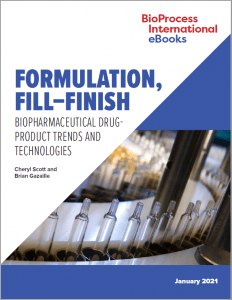 As with many other aspects of biopharmaceutical development, evolving technologies are transforming drug-product development and manufacturing. In a November 2020 report on the Informa Connect “Drug Delivery Partnerships” meeting, BPI senior technical editor Cheryl Scott reviewed how new delivery-device technologies are bringing together companies with disparate expertise to serve patients with chronic conditions better than ever before. The ever-increasing capabilities of electronics and information technology (IT) not only are enabling development of “smart” delivery devices, but also improving the potential (and business case) for automating drug-product formulation, testing, and manufacture. Meanwhile, new product modalities are challenging old delivery methods and pushing distribution systems to the limit — making companies consider alternatives anew. Even before all these developments, drug-product manufacturing often was considered to be a separate business from drug-substance production. And many, if not most, biopharmaceutical companies have counted on partnerships and outsourcing contracts to turn their bulk drug substances into formulated and packaged drug products.
As with many other aspects of biopharmaceutical development, evolving technologies are transforming drug-product development and manufacturing. In a November 2020 report on the Informa Connect “Drug Delivery Partnerships” meeting, BPI senior technical editor Cheryl Scott reviewed how new delivery-device technologies are bringing together companies with disparate expertise to serve patients with chronic conditions better than ever before. The ever-increasing capabilities of electronics and information technology (IT) not only are enabling development of “smart” delivery devices, but also improving the potential (and business case) for automating drug-product formulation, testing, and manufacture. Meanwhile, new product modalities are challenging old delivery methods and pushing distribution systems to the limit — making companies consider alternatives anew. Even before all these developments, drug-product manufacturing often was considered to be a separate business from drug-substance production. And many, if not most, biopharmaceutical companies have counted on partnerships and outsourcing contracts to turn their bulk drug substances into formulated and packaged drug products.
This eBook explores some ways that such trends are manifesting. First, Scott reviews how biologic drug-product manufacturing is changing to keep up with new and improved delivery methods and regulatory developments. Her analysis highlights some advancements in formulation analytics and considers where those changes might be taking the drug-product business. Next, BPI associate editor Brian Gazaille discusses a new freeze-drying method that could disrupt the cold-chain distribution paradigm in a post–COVID-19 world. His interview elucidates how inhalable formulations soon could be a viable option for emerging vaccines and biologics.
